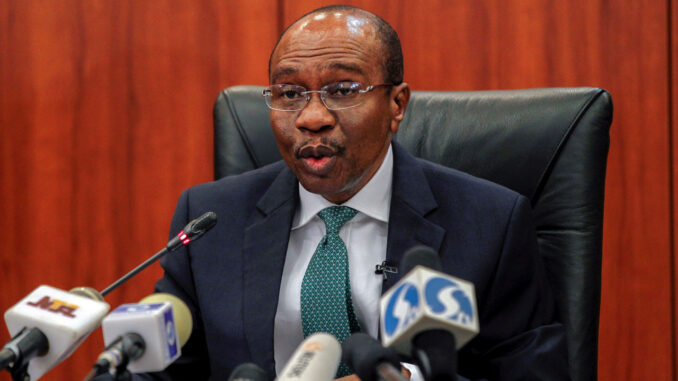
Since he announced plans to redesign some denominations of the naira last October 26, Central Bank of Nigeria (CBN) Governor Godwin Emefiele has pursued it with a singlemindededness never before displayed by any public official in the nation’s history. It is as if his being depends on changing the old N200, N500 and N1000 notes into new ones.
There is nothing that can stop him from having its way on the matter. It is either his way or no other way. For one, he announced the policy unilaterally, so to say, though he may not be entirely blamed for that. As it later emerged, he took President Muhammadu Buhari into confidence over his plans, but the Number One Citizen kept everything to himself until Emefiele went public.
As the overseer of our monetary policy by virtue of his leadership of CBN, Emefiele cannot be said to have broken any law over his plan. But as he well knows, there is no way he can embark on such a gigantic exercise without carrying those in charge of the fiscal policy along. The fiscal arm consists of revenue generating agencies which are all under the Ministry of Finance (MoFI). While the ministry formulates policies and generates revenue for the nation, the CBN oversees the monetary and other related instruments.
It is in the best interest of a nation that its central bank and finance ministry work together to promote and stimulate the economy. CBN said it was redesigning the notes to control the cash in circulation as well as curb currency-counterfeiting abd ransom payment. These are laudable objectives, if indeed, they are the reasons for taking the action. Currency redesigning is serious business. It is not just a matter of changing the colour of the old note and coming up with a new one. There is much more to it than that.
The squabble is over though, with some analysts blaming the President for not letting the ministry into Emefiele’s plan after he was informed. Emefiele has turned deaf ears to complaints over his undue rush of turning the country into a cashless economy, insisting on having it his own way. He was made to bend over the cash withdrawal limit, which he raised from an initial N100,000 and N500,000 to N500,000 and N5 million weekly for individuals and organisations. But on the redesigned notes, he says, there is no going back.
The new notes have since been released after the presentation of the specimens to the President last November 23. The old notes will cease being legal tenders on January 31, but the new notes are nowhere to be found despite Emefiele’s claim that they have been made available to banks, which will in turn, dispense them. The banks have refused to do so. They are still dispensing the old notes over-the-counter (OTC) and at the Automated Teller Machines (ATMs) in defiance of his directive.
What then should be done? Emefiele, instead of wielding his power as the Banker’s banker and the Banker of last resort, has turned himself to abuser of first resort. He has resorted to harassing and literally abusing depositors who are at the mercy of their banks which have refused to comply with his directive to start dispensing the new notes. If the banks had been doing so, a fair amount of the new notes would have gone into circulation by now.
But the notes can only be found with currency hawkers at motor parks, street corners, event centres and wherever the money exchange trade is booming. Who is to blame for this? Emefiele, of course. If only he had managed things well, depositors will not be going through any pain whatsoever in order to get the new notes. Yet, they are the ones he is flexing muscles with. Why can he not take on the banks that have flouted his directive with impunity? Or, is there more to this than we are being told?
In this matter of new notes, the banks have not been fair to customers at all. Why are they finding it difficult to load their ATMs with the new notes? Why can they not also pay the notes over-the-counter? What is the problem with dispensing the notes? Were they not given enough by CBN? If they were, why can CBN not take a stiffer action against them than that slap on the wrist fine of N1 million per day for each new naira notes’ box they refused to pick up and dispense to customers?
Is it not curious that banks are refusing to pick up the new notes? Why is that so? This is the question Emefiele must answer before insisting on enforcing the January 31 deadline for phasing out the old notes. If he cannot address the question truthfully and in full public glare, then there is no justification for his stand on that deadline. He and the banks should stop playing mind games with the banking public.
‘INEC, where’s our PVC?’
THE collection of the permanent voter’s card (PVC) ends on January 29, following the extension of the exercise by seven days. Some people, especially those who sought a transfer of their polling units, have not collected their PVCs and it is no fault of theirs. Their names are on the voter’s register online, but their PVCs have not been printed.
Despite assurances by officials of the Independent National Electoral Commission (INEC) in their respective wards that the cards are ready and would surely get to them before the elections, these eligible voters are worried. Many of them have heard such assurances before only to be disappointed at the last minute.
The problem, it was gathered, is from the Abuja headquarters of INEC and the agency is the only one that can redress the issue before the elections begin on February 25, with the presidential poll. ‘All, we are saying, do not disenfranchise us’, the voters are begging INEC.
END

Be the first to comment